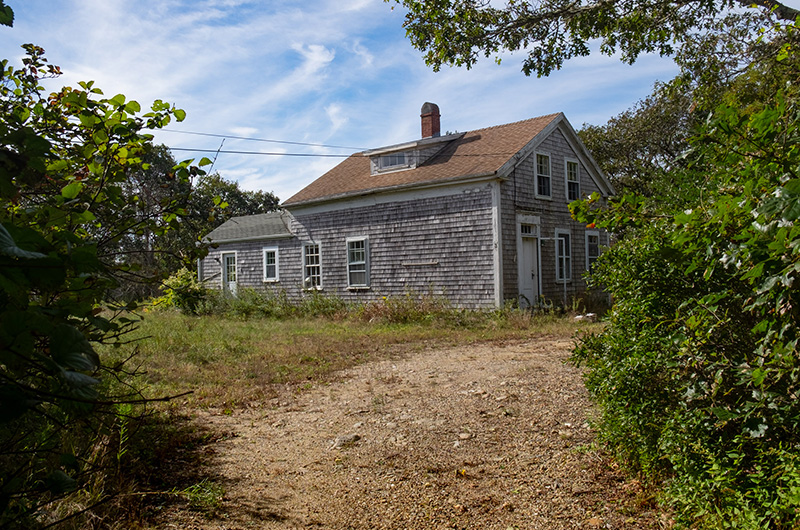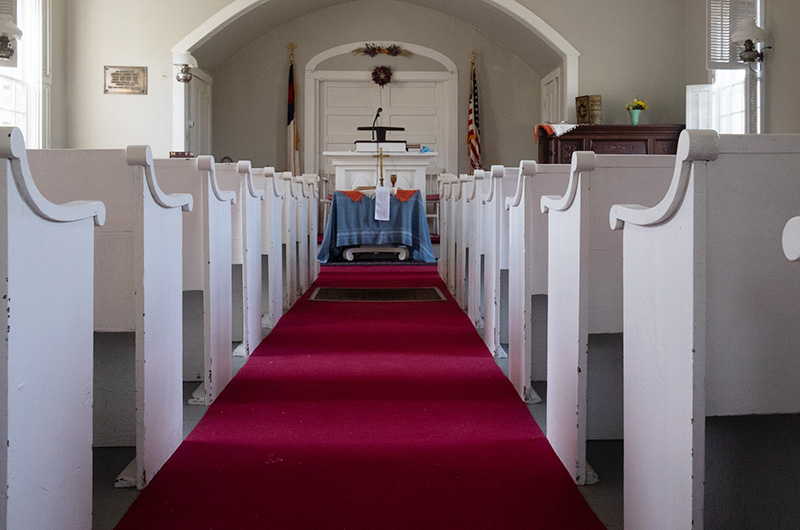This weekend the Community Baptist Church of Gay Head will celebrate its 325th anniversary. Planned festivities include a performance by the Black Rock drummers, communal singalongs, dances, discussion, worship and traditional Wampanoag fare at the Gay Head Cliffs. Yet as the oldest continuously worshiping Native American congregation in the United States looks forward to honoring its three and a quarter-century past, a recent tax lien placed on the church parsonage is a reminder of an uncertain financial future for the tiny church.

The issue of unpaid taxes on the parsonage, which sits adjacent to the church, has caused an uproar at the past two meetings of the Aquinnah selectmen, unbottling a decade of miscommunication and disagreement between the town selectmen and their assessors over whether the parsonage should have been taxed in the first place.
Assistant assessor Angela Cywinski claims the church lost its tax-exempt status in 2007 when it came to the attention of her board that the church had been renting out the parsonage for approximately $1,000 a month. Public records obtained from the Aquinnah town treasurer show that over the next decade, the parsonage accumulated approximately $16,000 in unpaid back taxes. In a letter to the church dated June 14, 2007, Ms. Cywinski wrote: “The explanation for the revised assessment is the lost [sic] of the charitable exemption status as stated in M.G.L Ch. 59, Sec 5,Clauses 10 and 11. The property must be for the ‘exclusive benefit’ and ‘used and occupied as a residence for clergy.’”
Ms. Cywinski said she received no reply to the 2007 letter until she met with church pastor Leo Christian this past July. Mr. Christian took over leadership of the church about a year and a half ago, and also serves as the pastor at the First Baptist Church in Vineyard Haven. For much of the past decade, the church lacked leadership in the form of a pastor, a factor Mr. Christian says contributed to the confusion surrounding the unpaid taxes.
“There was no church leadership who knew the law when the church became unrentable,” he said. “They just never cared about this tax stuff. They probably should have but they haven’t.”
The tenant vacated the parsonage shortly after 2007. In 2013 the board of health determined that the church’s well and septic system were too close to each other to comply with town health regulations. Although nearly $20,000 in Community Preservation Act funds have been set aside to repair the failed septic system, the church cannot accept the money due to an outstanding tax title lien that the assistant assessor placed on the parsonage in 2013.
Selectmen have verbally agreed that they do not want to pursue the tax collection. But the church cannot proceed with improvements until the lien is either forgiven or paid.
Meanwhile, the parsonage remains unoccupied and has fallen into disrepair. A crumbling driveway and overgrown weeds surround the building.
“Cosmetically, it needs a lot of TLC,” Pastor Christian said.
At the selectmen’s meeting this week, the pastor aired his frustration over the situation.
“The church entered into an agreement in good faith to put that parsonage into affordable housing,” he said. “The fact that you’re charging us taxes is unfair. Everyone has assumed for all these years that there was no tax on that [parsonage], but now we find out that we do owe tax . . . this has just sprung on me since this summer, and I thought we were going to wait until after this celebration. But we’re more than willing, if we owe tax, we want to pay it.”
For a small church lacking the broad financial resources of other religious institutions, the $16,709.46 tax bill represents a relatively hefty financial burden.
Town administrator Jeffrey Madison had stronger words about the tax lien on the parsonage.
“These terms are Trumpian,” he said. “It’s taking land from native peoples . . . that church has been around longer than me, and I’ve been around a very long time. I’m without words. The town has to do everything we can to get this sorted out.”
Mr. Madison said Ms. Cywinski did not exercise appropriate discretion.
“Legally, everything she’s doing is legal,” he said at the selectmen’s meeting this week. “But that doesn’t make it right.”
At a selectmen’s meeting two weeks ago Island Housing Trust project director Derrill Bazzy stood up for the church. “The church is a struggling institution that was very important and was providing affordable housing,” he said, “and taxing it created this downward spiral and the church is now deteriorating. And it’s like, why? For a few bucks?”
The selectmen have explored a few creative solutions for forgiving the church’s back taxes and preventing the assessor from taxing it in the future.
Mr. Bazzy, who hopes one day to use the parsonage for affordable housing again, sees that as a potential avenue to alleviate the tax burden.
“In my opinion, the town should just not tax the church property if it’s being rented affordably and not necessarily to a church member,” Mr. Bazzy said. “But as a fall back option, you can negotiate a payment in lieu of taxes. I think there are much simpler options that are out there that can leave the church in its maximum freedom in the long run for the next 325 years.”
Town treasurer Sibel Suman suggested that the town could hire a surveyor to redraw the lot lines to combine the parsonage and the church into one property, meaning the parsonage would no longer be taxed independently of the church. Selectman Jim Newman said recent changes in the state tax law have potentially opened up doors to forgiving 75 per cent of the tax bill, but that option would require further advice from town counsel.
The church has a regular Sunday attendance of around 20 enthusiastic parishioners. The numbers swell to as high as 60 during some weekends of the summer months, especially when Island musician, Ritz regular and Jesus look-alike Sean McMahon plays gospel tunes.
“There’s not a lot of bells and whistles,” parishioner Melissa St. John said. “It’s a simple church. Our mandate is to keep it simple, loving Jesus and loving each other. And use our history to look forward.”
The church has served as cultural center for the Wampanoag community since the 17th century. Although white European settlers used the gospel as means to assimilate native peoples, the church’s archives also include some of the earliest Wampanoag language bibles. At the celebration this weekend, parishioners and church deacons will host a discussion about reconciliation and the perception of the church throughout history.
“One of the Mayhews wrote the Wampanoag Bible,” Ms. St. John said. “The other side of it was people taking power and land way back when, telling people they couldn’t use their own language. It’ll be interesting to see what the discussion is about.”
For Pastor Christian, it’s unfortunate to have a shadow cast over the anniversary celebration.
“I told this to Angela [Ms. Cywinski],” he said. “This is an incredible celebration. I hated to have it clouded by this. Maybe by law you had to file this lien, and I respect the law, but this is complicated.”
He is confident that the church will eventually sort out the tangle of problems.
“The town will get their money,” he continued. “We could probably raise the money and pay if off right away, but there’s more things that have to be ironed out . . . This town, for over 300 years, this tribe, and this church, has worked together well. There’s nobody within the tribe, town, or church, that wants ill to anyone. We’ll do the right thing.”
He concluded: “This weekend, I hope to see everyone show up and show our support for this little piece of our community that has existed for so long.”







Comments (7)
Comments
Comment policy »